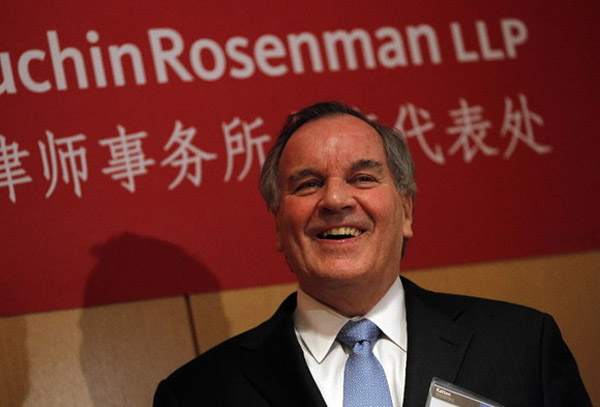
In China? At his office at 900 N. Michigan?
The death Friday of New York mayor Ed Koch, who left office in 1989 after three terms as mayor, got me wondering.
Until the end, Koch never stopped talking about issues big and small—in 17 books, including more than one memoir. He remained a yenta writ large. Robert McFadden, who wrote Koch’s obituary for the New York Times, described Koch as a “one-man media show.” He opined on radio, TV, in news conferences, speeches, reviews of movies, books, restaurants personalities, issues; he held forth in columns in the New York Post, the New York Daily News. He served as a television judge for The People’s Court, a professor, a bit player in movies and television, an endorser of commercial products and of candidates for offices ranging from mayor to president.
Rich Daley, on the other hand, seems to have disappeared from public life. He is eerily silent, almost against-human-nature silent, even when his successor, Rahm Emanuel, gently (for Rahm) blames his predecessor for the parking meter deal—most lately in connection with Rahm’s plan to privatize Midway the right way.
Rahm and his police superintendent, Garry McCarthy, fail to contain the whizzing bullets that have made life a crap shoot on the south and west sides. In desperation, they announce a policing plan— a Targeted Response Unit and the Mobile Strike Force—put into place by Daley and disbanded by Emanuel/McCarthy. Daley stays silent.
When Hadiya Pendleton, the 15-year-old drum majorette who had performed at Obama’s inauguration, is shot to death in a city park last week, it becomes a national and international story—and the impetus for the return to the Daley-era policing procedure. If Daley offered condolences to the girl’s family, we don’t know about it.
Rich’s brother Bill toys with the possibility of running for governor and mentions that he refrained from running before because he didn’t want put himself forward while his brother was mayor. Not a word from Rich. Both Jesse Jackson Jr. and his wife Sandi resign from high-profile positions as, respectively, congressman and alderman. Nothing from Rich.
Illinois gets its credit rating cut and Daley says nothing. Ditto on closing schools.
Is Rich lacking a model for his ex-mayor years? His father, Richard J., died while still in office, in his doctor’s office one cold Friday in December, 1976.
If Rich Daley has a model, it seems to be George W. Bush (rather than Bill Clinton)—leave office, give some speeches, and shut up; with the difference though that Rich Daley is actively involved in business.
Daley signed with the Harry Walker agency and he’s signing contracts to give speeches, but if he says anything newsworthy it’s yet to be reported.
And consider soon-to-be-retired three-term mayor Mike Bloomberg, who is reluctantly leaving office—if he could he’d probably bulldoze through a change in the law so he could run for a fourth term—and would obviously love to be President. Bloomberg is currently weighing in with a television ad through his Super PAC, Independence USA, in the second district special election to replace Jackson Jr. Watch for more of the same when he “retires” from office. Or consider Rudy Giuliani, a regular on cable shows who is buck-racking with the best of them, but who also seems to think that the world would be a better place were he President.
Like his father, Richard M. never aspired to an office higher than mayor of Chicago.
So Rich gives paid speeches. He’s a director of the Coca Cola Company. He’s of counsel to Katten Muchin Rosenman and a senior advisor to JP Morgan Chase. He travels to do deals in China and other cities around the world. He founded Tur Partners—his son Patrick is a principal—“an investment and advisory firm that partners with global businesses to drive expansion into new and existing markets.”
Oh, and in the good works category: He’s a senior fellow at the Harris School of Public Policy at the University of Chicago. According to the school’s website, he "coordinates a guest lecture series that includes a variety of perspectives and approaches concerning the major issues facing cities in the 21st century. The 10 annual guest lectures…. bring policymakers from around the globe to debate critical urban policy challenges, and help train future policy leaders at Chicago Harris."
Photograph: Chicago Tribune


